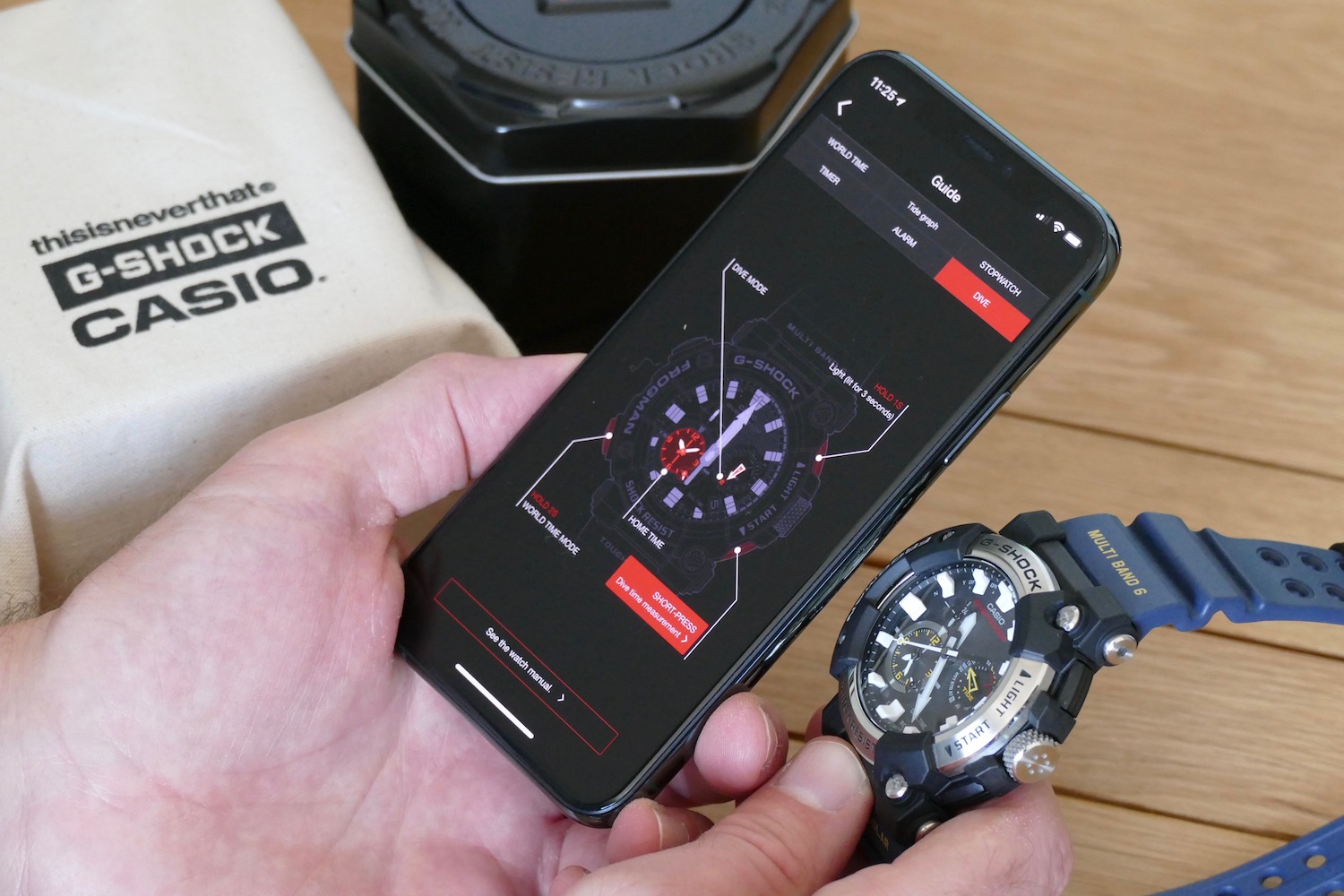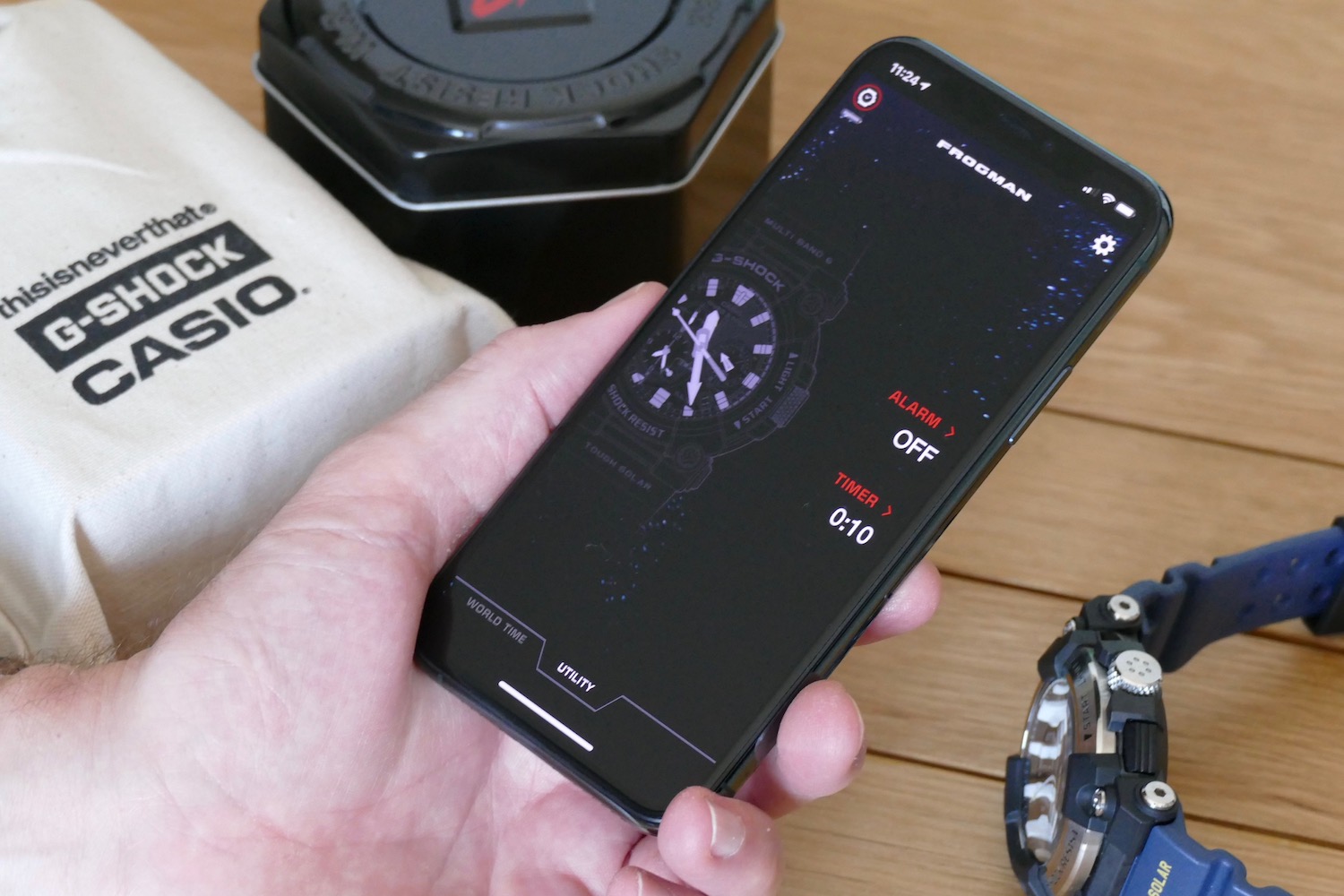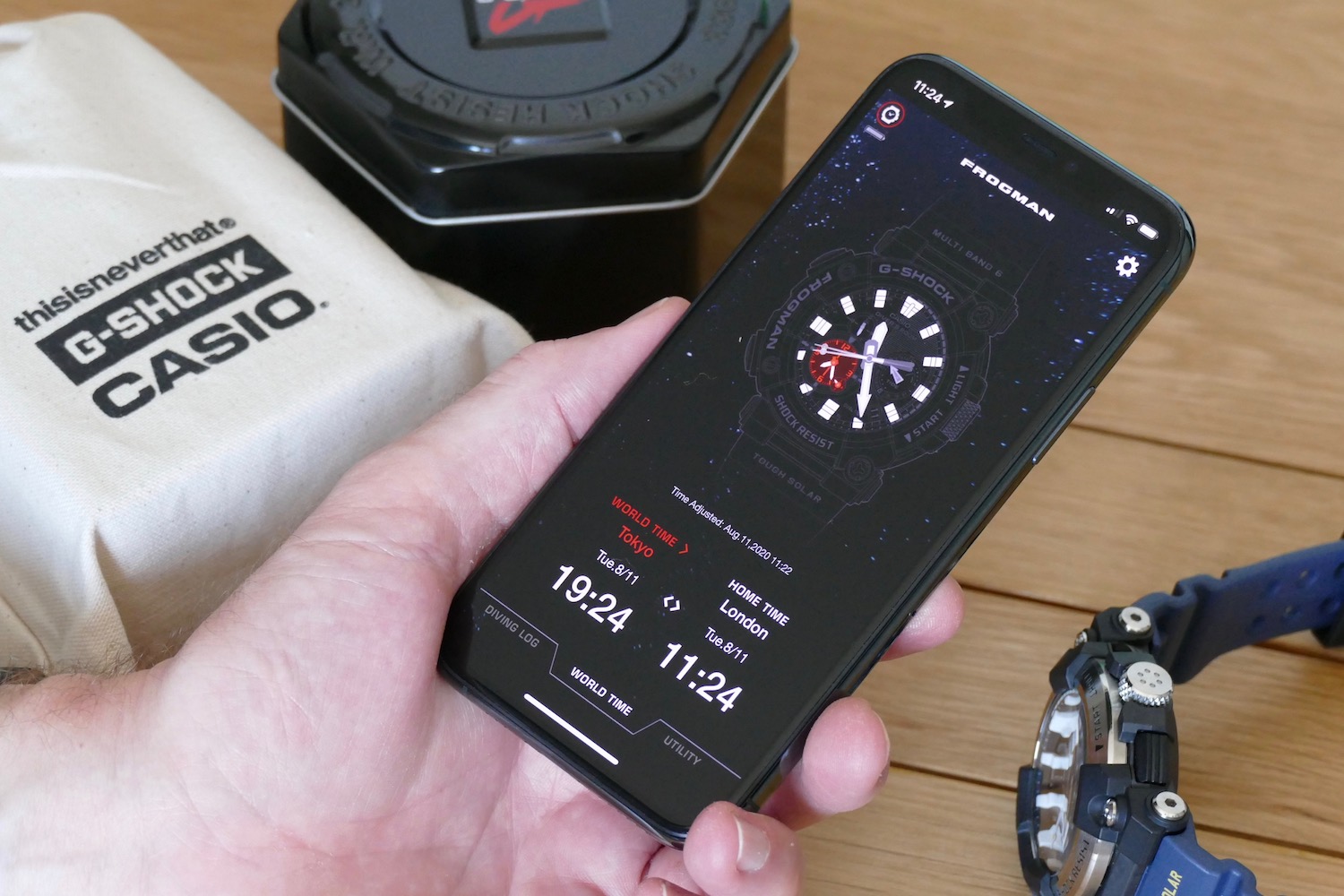“The Casio GWF-A1000 Frogman is a handy dive watch with just enough connectivity features to get by.”
- G-Shock toughness
- Sapphire crystal over the dial
- Reliable G-Shock Connected app
- Easy to understand dive functionality
- Solar power means there's no need to charge
- No depth sensor
- Massive on most wrists
- No step tracker
Casio has almost completely embraced connected technology on its conventional watches. Smarter tech has come to the G-Shock and Pro Trek ranges of watches, from the WearOS-powered Pro Trek WSD-F30 and the Pro Trek PRT-B50 to the more recent G-Shock GBD-H1000 Move.
Now, Casio has brought its most basic level of connectivity to the Frogman dive-centric watch line with the GWF-A1000. It’s not what I’d call a smartwatch, but it uses Bluetooth tech to make living with the watch easier, while also adding some features relevant to those who may go diving with it.
The new Frogman dive watch boasts more than just a tech update. The previously all-digital face has been swapped for an analog face, then wrapped in the brand’s iconic carbon monocoque body.
Design

The GWF-A1000 may have an analog movement, but it’s still obviously a G-Shock Frogman in its design. Those familiar with the range will recognize the trademark asymmetrical style and the frog logo on the case back. The asymmetrical shape stops the case from hitting your wrist when you’re bending it, and makes the buttons easier to press. There are four buttons in total, with only those on the left of the case being immediately obvious. The other two flank the attractively knurled and very grippy crown.
With its carbon monocoque construction Casio has been able to remove the button guards found on previous Frogman watches, yet retain the overall strength, while also making the watch much lighter. It weighs 119 grams (0.26 pounds), down from the 141 grams for the previous generation watch. That’s an improvement, but you definitely know it’s on your wrist. For comparison, the heaviest Apple Watch Series 5 weighs still comes in at under 50 grams — or 0.11 pounds.
Try to purposefully damage the Frogman, or any G-Shock really, and you’d probably fail.
It’s also really large, with a case size of 56mm and a whopping 19mm thickness. Then again, the size should be no surprise. The Frogman has always been one of G-Shock’s largest and most recognizable watches, and the A1000 is no exception. The thickness alludes to the key G-Shock’s key trait: toughness. The all-in-one carbon case envelopes the movement and technology inside, giving the watch supreme shock protection and an ISO-rated 200-meter water resistance.
It’s resistant to magnetic fields and vibrations, and the face is covered with scratch-resistant sapphire crystal. The thick fluoroelastomer band is secured on the watch by large pins through the carbon/resin case, and is itself resistant to water and dirt. You could try to purposefully damage the Frogman, or any G-Shock really, but you’d probably fail. This wearability, combined with the unique design and useful tech, is what makes me love G-Shock watches.

The sapphire crystal has superb clarity and a distinctive sheen, plus a very subtle curve to it, adding depth to the face and catching the light beautifully on the wrist. The buttons are large and have a positive action. The screw-down crown takes a little effort to loosen (don’t forget to screw it back up again, otherwise the watch won’t be water resistant), but it’s no problem to do so, even when the watch is on your wrist.
How is it on the wrist? You, and everyone else, will know it’s there. This is a statement watch and highly noticeable. The strap isn’t especially pliable, but this hasn’t been a problem as the watch should be worn loosely. I never felt the watch was uncomfortable unless it was underneath a sleeve.
Make no mistake, it’s not for skinny wrists.
Because of the bulk, it’s best to push your sleeve back when wearing the Frogman. You will have to make a few compromises if you plan to wear the A1000 every day, but then I personally don’t really think it is an everyday watch in the first place. To me, it’s a dive-focused summer watch worn to be shown off.

The Frogman’s busy, asymmetric design means it’s not for everyone. It’s clearly not for small wrists, for example, but Casio’s switch to analog brings it into line with other popular dive watches from makers like Seiko, and the moderate reduction in weight and bulk means it could appeal to those who are less likely to actually go diving with it. Make no mistake though, it’s not for skinny wrists.
I’ve long been a fan of the Frogman’s unusual design, and replacing the digital display with three subdials and a small date window has done nothing to change its visual appeal.
G-Shock Connected app
The Frogman connects to the G-Shock Connected app on your phone using Bluetooth. It’s well-designed, fast, stable, and provides an easy way to change various features on the watch, in addition to managing dive-specific features. I like the way it remembers all other Bluetooth-equipped G-Shock watches too, so there’s no need to perform any additional setup after registering a new model, a feature I would love to see in WearOS.

Connection is simple to activate with a single button press on the watch. I used the GWF-A1000 connected to an iPhone 11 Pro, but there’s also an app available for Android. Setting the World Time is a great example of how the app speeds up some processes. Tap the World Time tab, select your city, and tap sync. The time is then sent to the Frogman’s subdial, and the complete process takes no time at all. A button tap in the app swaps the world and home times quickly too, which is great for travel. This simplicity of use is repeated when setting alarms and timers.
For divers, the app includes a dive log feature, and the ability to add a tide point measurement location. It’s a long button press to put the watch into Dive Mode, at which time the main hour and minute hands move to the 12 o’clock position, and the time swaps to the World Time subdial. Start the dive and the second hand starts, with elapsed total time shown by the main hands, which move together as one for clarity. Bright lume on the hands and on the bezel between the 12 and 20 position make judging time in the dark easy.
Stop the dive sequence and the hands return to 12 o’clock, and the second hands goes in reverse to indicate surface interval time. The data from the watch is then saved in the app, complete with location data and the chance to add photos, as well as include information on conditions, depth, temperature, and your gear. Both the dive mode and the dive log are easy to use, even for someone not familiar with dive watches, but you do have to spend a short time learning how it all works. The good news is the app provides comprehensive instructions on how everything works, acting as a digital manual too.
The watch doesn’t have a vibrate feature, so there’s no chance of notification support ever being added. This isn’t something I’d really want on the watch, but it’s a shame Casio doesn’t just add an accelerometer and step tracking to all its connected watches. Having this general feature would add value to the GWF-A1000.
The connection to the iPhone app is constant unless you disconnect it or fully close the app. While it’s connected, it does activate your phone’s GPS, meaning it’ll draw some battery power.

While the Frogman doesn’t deliver notifications, have a touchscreen, or run apps, the Bluetooth connection makes using the watch’s functions quicker and easier, while also adding some relevant functionality to increase the watch’s usefulness. It does so with a reliable and easy to use app. Casio shows how many other watch manufacturers looking at building a connected timepiece should be doing things.
Buttons and features

There are four buttons and the crown on the watch itself. The Menu button at 8 o’clock switches between Tide mode, calendar mode, the stopwatch, and the timer. The 3 o’clock subdial shows the watch’s status, and also displays the tide point when it has been set in the app. The buttons are precise and have a hefty feel to them. I like the way you can press a button and the hands move out of the way so you can easily view the two subdials as well.
The time can be set through the app, where it’s based on the time on your phone, or through the radio-controlled Multi Band 6 system, where the correct time is wirelessly taken from a series of remote stations around the world at set intervals. In my experience, Multi Band 6 usually requires some patience before it works. It’s dependent on location and signal, making the app the fastest way to adjust the time after changing time zones. The crown can also be used to set the time.
I enjoyed the the speed with which the hands move when using special features. They’re fast, so you’re never waiting for them to get out of the way, and nothing feels like it takes too long. We’re conditioned to expect devices to react speedily these days, and the GWF-A1000’s triple dual-core motors that control the hands can keep up with our demands.

It’s important to note that although this is a dive watch, it does not have a depth sensor, something the all-digital GWF-D1000 G-Shock Frogman watches have. Whether this makes it less of a dive watch is up for debate and will potentially depend on how serious you are about diving, but it’s arguably in keeping with the design and build alterations, which push the GWF-A1000 toward the watch fan who may never actually go diving at all.
Battery and charging
Just because the Frogman has a Bluetooth connection doesn’t mean it requires regular charging using a cable. The GWF-A1000 has solar charging and doesn’t require any other power to continue working. Battery level can be checked in the app, and if the battery goes flat, it takes two hours of direct sunlight for it to start operating again, and a further 21 hours until it’s full. Times vary depending on the light source, but the watch will take energy from anything down to fluorescent lighting in the house.

If your watch is in regular use, it’s unlikely the battery will ever go flat, as it only needs eight minutes of exposure to sunlight to gain enough power for an entire day of use. So if you’re out for a day, the battery is likely to remain full. With the exception of a few trips outside, I’ve been mostly inside while wearing the Frogman for more than a week, and the battery level has not moved from full. Casio states a full battery will last for about five months without seeing any light.
Price and availability
You can buy the G-Shock GWF-A1000 Frogman now from G-Shock’s online store and boutiques. In the U.S., it’s yours for $800. In the U.K., it’s 699 British pounds.
Our take
The GWF-A1000 Frogman uses connected technology in a beneficial manner inside an always-desirable G-Shock watch. Even if you never go diving with it, you’ll still be left with an extremely tough watch that delivers the sought-after dive watch look.
However, it’s not a smartwatch, so don’t expect it to compete with the Apple Watch or WearOS watches in terms of connectivity or features.
Is there a better alternative?
There are very few connected dive watches available. If your list says “dive” and “Bluetooth connection,” then you’ll be looking mostly at the G-Shock GWF-A1000 Frogman. If you’re considering a full-fledged smartwatch though, you can get a more feature-rich model for less money.
If you own an iPhone and want a smartwatch, the $400 Apple Watch Series 5 is the one to buy. If you have an Android phone, then we recommend the $280 Samsung Galaxy Watch Active 2, which has great software and a neat design. If you’re a Casio fan, the $500 Pro Trek WSD-F30 is a tough, outdoorsy WearOS smartwatch, while the $500 Suunto 7 is a high-tech sports-focused WearOS watchthat’s worthy of consideration.
If the Frogman appeals but you don’t dive (not that it really matters), similar functionality is available on the G-Shock Mudmaster and the G-Shock Gravitymaster. These have different designs that may suit your lifestyle more. Finally, Fossil makes various hybrid smartwatches that add basic smartwatch features to a watch that looks like a normal watch.
How long will it last?
Solar charging, no software on the watch that needs updating, no tech like a touchscreen to either go wrong or age the watch prematurely, and the incredible toughness of a G-Shock means the GWF-A1000 will last, well, indefinitely. The only aspect which may reach the end of its useful life is the app, should Casio decide to alter the way it connects with its watches in the future.
Should you buy one?
Yes. Casio demonstrates that it is possible to blend connected tech with a desirable hybrid timepiece, and that you don’t have to always turn to fashion watches to get it.








